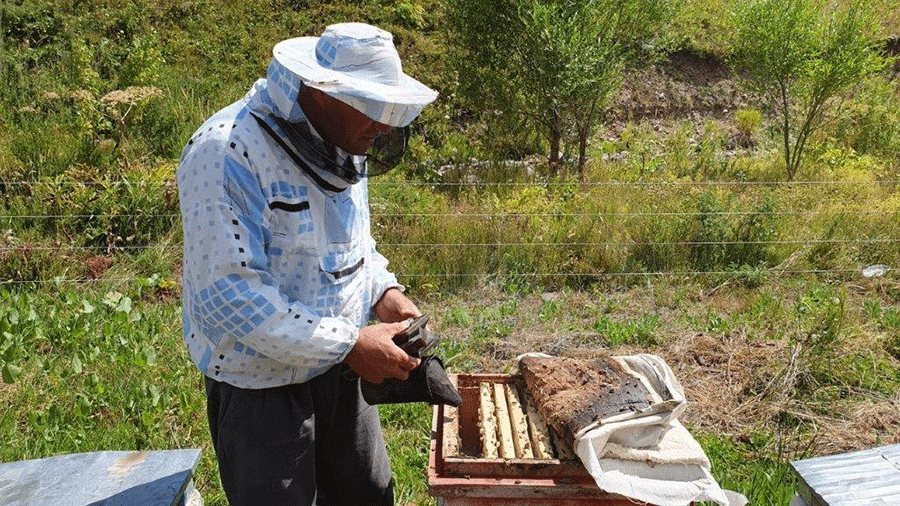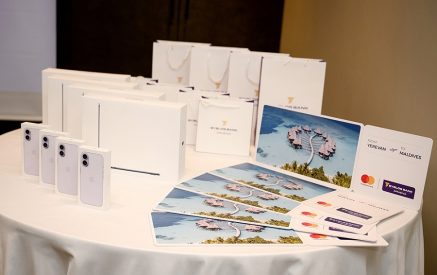Honeycomb is over in Yeghegis community.
Honey-loving clumsy bears appear so often in Vayots Dzor that capturing them with mobile phones has become commonplace. In the village of Shatin, bears appear at any time of the day in different places. And their behavior depends on how hungry they’ll be. The last time, farmer Norayr Martirosyan met the animal face-to-face after midnight, near the source of the Yeghegis River, at an altitude of about 2300 meters, on the territory of his apiary. It was not a bearcub, but a huge bear. The beehives were saved thanks to the new technology of the solar-powered electric fence.
“That day, after midnight I felt the real power of the electric fence for the first time. The dog was restless, so we left the tent and saw the bear wanting to take the beehive. The bear touched the electric fence and stood lost, then began looking for another way to get to the beehive. We made an attempt to drive the bear away, but it turned around and tried to approach the nearest beehive from another direction. And so, after about half an hour of unsuccessful attempts, the angry bear crossed the river and disappeared into the nearby trees. I would have never imagined that a bear could be a step or two away from a beehive. It came so unexpectedly, I did not even manage to capture it on my phone. The bear was so big that it won’t be satisfied with just one beehive”, said farmer Norayr Martirosyan.
The farmers consider the joint program of Viva-MTS and the Foundation for the Preservation of Wildlife and Cultural Assets (FPWC) to be effective. Its real result is the rich harvest of honey. Although the year was not favorable for beekeeping in terms of weather conditions, it was possible to get a good harvest by moving the beehives to two or three fields. Movable electric fences provided the flexibility to move them from place to place and re-fence in a new area very quickly. The bees worked hard, did not move to other beehives, made more circles and provided a pure harvest. The number of beehives has increased from fifty to eighty. The number of foraging paths has reached three hundred, the amount of honey produced has increased. Norayr, who has been engaged in beekeeping for eight years, is sure that without the help of the electric fence, the consequences of a bear attack could not have been avoided. Now the bees are being prepared for preventive vaccinations against various diseases in anticipation of providing a better harvest next year.
Viva-MTS and the Foundation for the Preservation of Wildlife and Cultural Assets (FPWC) take care for the conservation of the ecosystem not only within the framework of internationally proclaimed specific days, but almost on a daily basis through programs that ensure long-lasting results. The partners for many years prioritize the process of introducing new technologies in communities and the courses conducted for their application. The farmers can fence 1 ha area in 10-15 minutes. Environmental challenges are solved through the use of new technologies that form environmental awareness.
Viva-MTS (MTS Armenia CJSC) is Armenia’s leading telecommunications operator, having the widest network reach and spreading a wide range of Voice and Data services all across Armenia. Having the best of the Armenian people at heart since its launch on 1st July 2005 and in a short period of time Viva-MTS has managed to build a nationwide network and a considerable customer base. Viva-MTS drives innovation and aims at always being at the forefront of any development serving the Armenian mobile communications market. The company follows the guidance provided by ISO 26000 (International Standard of Social Responsibility), ISO/IEC 27001:2013 (Information Security Management System) and ISO 37001 (International anti-bribery management systems standard).
About “Eco Villages Network” project
Eco villages network includes selected intentional or traditional communities throughout Armenia, that are consciously designed through locally owned, participatory processes to regenerate their social, cultural, economic and natural environments.
The core idea behind the whole concept of the ecovillages is integrating the four dimensions of sustainability – ecological, economic, cultural and social – through integral, participatory design.
The project is a new format of the long-term cooperation between the Foundation for the Preservation of Wildlife and Cultural Assets (FPWC), VivaCell-MTS and the Global Ecovillages Network (GEN) in the field of environmental protection and sustainable use of natural resources.
About FPWC
The Foundation for the Preservation of Wildlife and Cultural Assets (FPWC) was founded in Y2002. FPWC is a member organization of the International Union for the Conservation of Nature (IUCN) since Y2012.
FPWC’s mission is to publicize the unique natural heritage of Armenia and the importance of biodiversity conservation, environmental issues and the importance of preserving nature. We aim to reduce human and wildlife conflict and its consequences to reduce the risks of endangered species of flora and fauna.
Biodiversity conservation, environmental education, community development and public awareness are the main directions of our activities.

























































